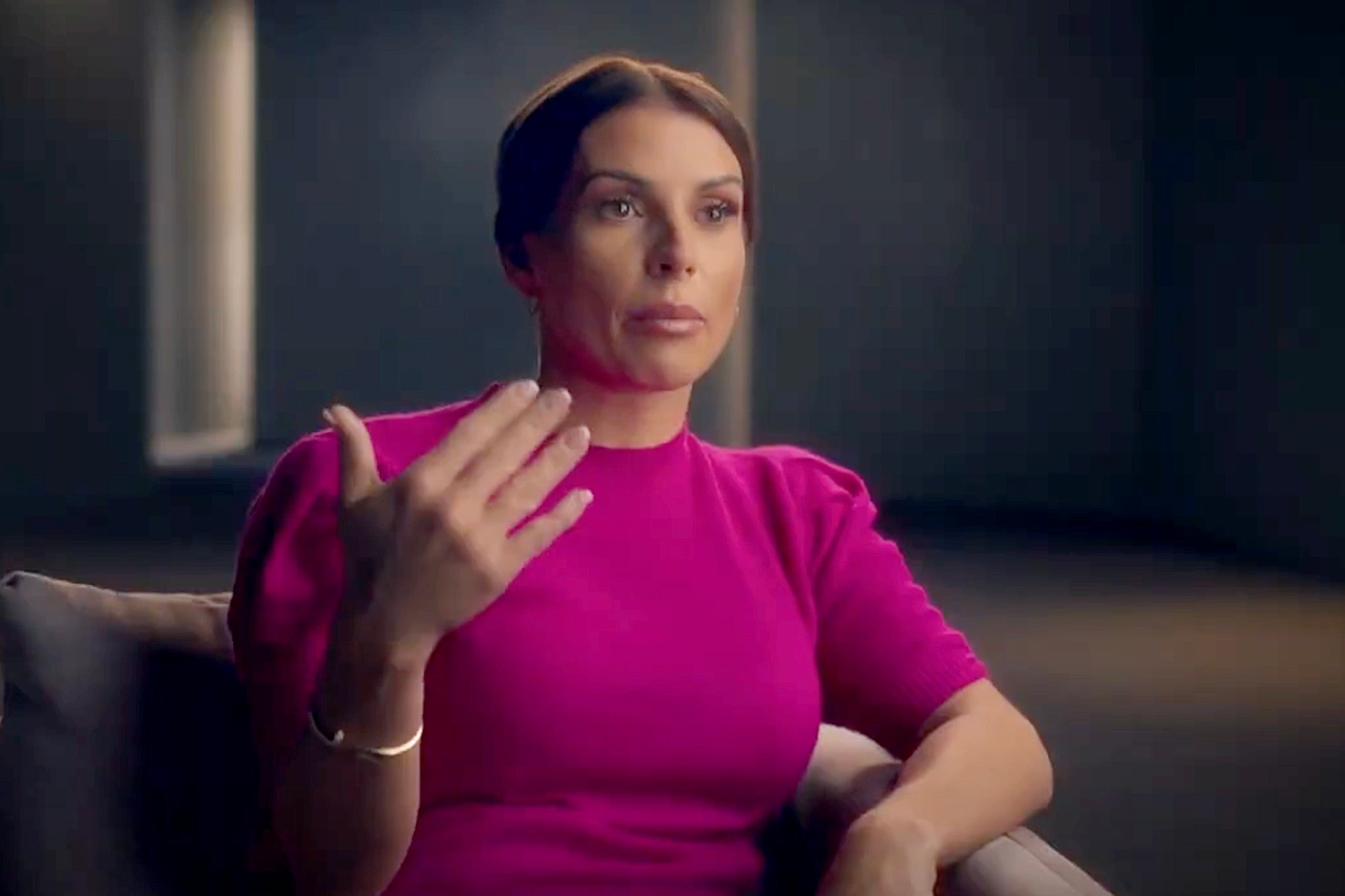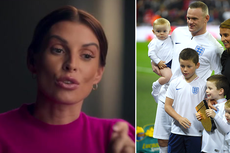Wagatha Christie’s big reveal? Wayne Rooney’s a genius
Watching Disney’s big-budget doc on the Rooney/Vardy case, it strikes Tom Peck that Coleen should have encouraged her footballer husband to follow his dream and go to law school – his brilliant advice would have saved us all a lot of grief


Towards the end of part three of Disney+’s Coleen Rooney: The Real Wagatha Story, Coleen lets it be known that Wayne was so energised by his proximity to the multimillion-pound court case that captivated the nation that he “had all these plans about going to law school”.
Coleen then informs us that she told him to “shut up”. But, on the accumulated evidence of several more hours of the big-budget Wagatha Christie documentary, this being the definitive Coleen Rooney account, it is arguable that Manchester United and England’s leading goalscorer picked the wrong career.
Across the full 150 minutes, Rooney (Wayne, that is) doesn’t say much, but each fully formed thought he is permitted to insert into the narrative could hardly be more perfect. Whatever Man Utd might have paid him is nothing compared to the value of his advice to his wife, which she may, looking back, wish she hadn’t ignored.
Several years before Wagatha came to court, before the epic “reveal” post, we now know that Wayne did tell her that the most straightforward solution to her Instagram-based problems was: “Just delete it.”
It is reassuring to know that, at least somewhere, in all that beautiful chaos that unfolded over several years like a giant lily on timelapse in an Attenborough documentary, it was pointed out, at least once, that, you know, you could just delete it. “Social media is not something that you need,” Wayne says he told his wife. “But she said no. And that’s what I like about her. She’s stubborn.”
The precise sums are not known, but if Wayne Rooney LLP had chosen to bill for that advice, its retail value could have run well into six figures. But it wasn’t taken.
He knows it wasn’t taken, because later we see a cheerful, smiling Wayne, breezily announcing the moment when he, like the rest of the world, saw his wife’s internet-breaking accusation. “I remember thinking,” he says: “What’s she done here?” And then he has a little chuckle.
What she did is, by now, very well known. She accused Rebekah Vardy of selling stories from her private Instagram to the Sun newspaper. Vardy sued her and lost, and a fractured nation had a somewhat joyous fortnight coming together over a bitter row between two people that should have stayed in an Instagram comments section but instead took place in the High Court (and I consider myself very lucky to have witnessed it first-hand).
It’s certainly an enjoyable watch. “History is written by the victors,” Winston Churchill once said, almost certainly apocryphally, and this particular history certainly is. Having appeared in more than one Wagatha Christie documentary myself, I have a keener interest than most in the closing credits, to see who’s involved. So it was interesting to spot, among the executive producers of this one, that not exactly well-known factual entertainment TV industry veteran, Paul Stretford – Wayne Rooney’s very long-time agent.
The gravest challenge of any true-crime drama always comes when they find themselves having to film actual reconstructions of, more often than not, rather unpleasant murders. This one has the distinct advantage of all its “crimes” having occurred on smartphones. CGI rostrum cameras recreate Coleen’s excitable scrolling through the various options as she chooses what Instagram filter to place on what posts.
For those of us who lived and breathed every day of that court case, there is real drama in seeing its big moments recreated in stirring slo-mo. In footballing dramatisations, you might see the camera cut from the eyes of the striker to the sweep of the boot across the turf, to the ball in the air, and then, ultimately, to the billowing net. Here you have all that, but instead, it’s the cropping of the crucial photo, the clicking sound of the keys as text is added – mainly, let’s face it, cry-laugh emojis – and then the caption being dragged into place: “RIP half a Honda.”
For some, it’s just a mid-budget SUV involved in a minor prang. But for those who know the Wagatha canon, that Honda was the quite literal deus ex machina. No explanation is needed.
It is, of course, hardly surprising that a court case that cost both its participants very large amounts of money has now resulted in their participation in at least one documentary series each. The ledgers have to be squared. When the monetisation of your private life has accidentally cost you a fortune, now would hardly be the time to stop.
Indeed, such a boom time is it for transparently self-authored factual entertainment documentaries that they can’t seem to prevent themselves from turning into Marvel-style crossover events. Remember those two notorious Manchester pap brothers who are interviewed at great length in Netflix’s Beckham? Well, suddenly there’s one of them standing outside a Caffe Nero in Cheshire, pointing his flashbulb through the windscreen of Coleen’s Range Rover, to which she can do little more than laugh.
You could, if you wanted, argue that it is a curious turn of events that a court case fought over invasions of privacy should have spawned a three-part documentary that begins with Coleen being filmed and interviewed in her own car, as she opens the electric gates of her own home and drives those cameras right inside. But then, one has to acknowledge that privacy is a right, as much as it is anything material. Your life is yours to share, not anyone else’s.
It doesn’t make her a hypocrite – but the question of quite what expectation of privacy you can have over information shared with 300 of your closest friends on Instagram is never quite solved.
But would you really want it to be? What would be the fun in that?
Join our commenting forum
Join thought-provoking conversations, follow other Independent readers and see their replies
Comments



Bookmark popover
Removed from bookmarks